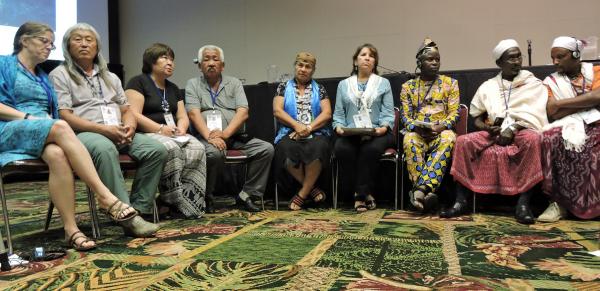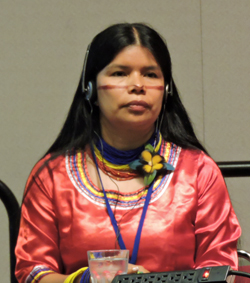Indigenous Peoples Still Fighting to Protect ‘Living Forests’ and Way of Life

Victoria Tauli-Corpuz, the United Nations Special Rapporteur on the Rights of Indigenous Peoples, says that despite the importance of protected areas and the recognition of indigenous territories to preserve the Earth, Indigenous Peoples are still fighting for their rights and to maintain their way of living. “There is an uncontrolled expansion of agriculture, big industries, dams, mining and oil companies affecting even the most sensitive ecosystems in the world,” she said recently at the International Union for The Conservation of Nation World Conservation Congress in Honolulu, Hawaii.
Tauli-Copruz spoke about the efforts indigenous communities have made to secure the full recognition of their rights. Those efforts have lead to some advances, but in some cases those rights have not been acknowledged – rather taken away and denounced. “There is still a long way to go,” she added.
Tauli-Corpuz emphasized that the recognition of indigenous rights is the result of the indigenous movements, mainly in Latin America, and that last year there were 146 killings of indigenous leaders related to this issue.
According to the Rapporteur, corporations are guiding the priorities. “That is the contradiction because what we need to do is to reinforce the traditional knowledge and traditional systems,” she said.
IUCN motion for the indigenous communities
In a landmark decision, the International Union for the Conservation of Nature (IUCN) Members Assembly, voted to create a new category of membership for Indigenous Peoples’ organizations during the recent summit in Honolulu, a unique membership union gathering 217 state and government agencies, 1,066 NGOs, and networks of over 16,000 experts worldwide.
IUCN Members called “for all protected areas to be considered as no-go areas for environmentally damaging industrial activities and infrastructure developments. IUCN Members emphasized the need for respect of Indigenous Peoples’ rights as a high priority, to ensure their free, prior and informed consent in relation to activities in sacred natural sites and territories conserved by Indigenous Peoples and local communities. To date, only World Heritage sites have been recognized as off limit.”

Sarayakus fight for sacred places
In 2012 the Inter-American Court of Human Rights ruled in favor of the Sarayaku in the case of Sarayaku v. Ecuador, affirming the right of free, prior and informed consent of Indigenous Peoples. The Sarayaku fought against the state because a foreign oil company was allowed to encroach on their traditional lands in the 1990s.
But despite losing the trial “the government has continued to award oil titles in the surroundings of Sarayaku’s land and even inside,” said Paula Gualinga, director of International Relations for the Kichwa community of Sarayaku, in Ecuador, in an interview with ICTMN.
“But we are still fighting and we want to declare parts of our land that are pristine, sacred places.”
The Sarayakus are also promoting the recognition of “living forests.” “It means that in the forests there are not only rivers, trees and animals. It is also the habitat of beings that have the duty to balance the ecosystems, to give continuity to nature,” Gualinga explained. “If those spiritual beings disappear there will be chaos, it will be a catastrophe.”
Gualinga said that those beings are not just spirits, but beings just like you and me. “Their function is to take care of Mother Earth.” Sarayaku’s people believe that the reason why the actual efforts on conservation are not working is because the lack of recognition to these beings.
The proposal says that “recognizing rights of nature means that human activities and development must not interfere with the ability of ecosystems to absorb their effects, to regenerate their natural capacities, to thrive and evolve, and requires that those responsible, including corporate actors, be held fully accountable for negative impacts on.”
“Our proposal goes beyond the mere conservation. We are talking about the rights of indigenous populations, the rights of nature and the rights of those creatures protecting the ecosystems,” she added.
The idea of “living forests” was launched during the climate summit that took place last December in Paris, France.
Sarayakus lands cover more than 333,000 acres. The community says that during the oil seismics made by international companies before 2012, about 24,710 acres were damaged. Today nobody can enter that land because of the risks of explosives remaining there.
“The State of Ecuador has the capacity to destroy but once they do, they cannot repair,” she said.
The Sarayaku community has a population of about 1.250 people.
Read more at http://indiancountrytodaymedianetwork.com/2016/09/24/indigenous-still-fighting-protect-living-forests-and-way-life-165869